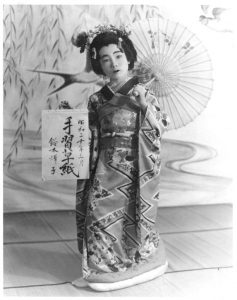By Margaret Kokka
In the 1930’s my Japanese immigrant parents had forged their life dependent on my father’s work for the Pacific railroad that provided a company owned house. Located in a rural isolated whistle stop in eastern Oregon with no neighbors for miles around, my two brothers and I formed our own playgroup. The three of us (born two years apart) ate, slept, fought, and played together. We shared a nanny goat who provided us with milk, Our playground was along the banks of the nearby Deschutes River or in our backyard covered with tumbleweeds swirling in the hot summer heat. During our first six years we shared childhood diseases—measles, whooping cough and the occasional flu. We grew up without the benefit of electricity, indoor bathroom facilities, or hot running water but this was not experienced as a hardship; the inconvenience of an outhouse, heating water for our outdoor “hot tub” or grinding the gramophone to listen to Japanese music recordings were simply part of our life.
∼ Continue Reading ∼

